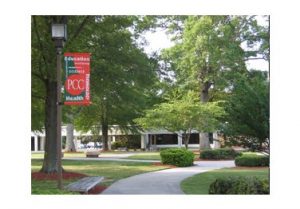Published October 6, 2010 By CED Program Interns & Students
Andrew Guinn is a graduate student in the UNC Department of City and Regional Planning and a Community Campus Partnership intern in Caswell and Lenoir Counties.
Community-Campus Partnership interns are working to facilitate collaboration between the Caswell County Partnership for Children (PFC) and Piedmont Community College (PCC) in order to satisfy the PFC’s need to update its website. The website provides stakeholders in Caswell County with valuable information, including details surrounding the PFC’s programs, resources targeted at local parents and teachers, and contact information for accredited childcare service providers. Unfortunately, given the presence of more pressing needs within the PFC as well as the current budget environment throughout the state, it has become difficult for the Partnership to allocate its own resources towards revamping its website.
 During the summer, CCP interns reviewed the website and made the recommendations that would ensure that information be conveyed more clearly and directly to users. Given the time and resource constraints facing CCP and the PFC, however, it seemed unfeasible for either organization to take on the task of rewriting the web page. Fortunately, Caswell County has a tremendous local asset that can fill this gap: Piedmont Community College. Not only does PCC have a phenomenal digital media lab, it also enrolls students who could stand to benefit from working on a real-world, client-based web design project for PFC. Furthermore, the PCC’s permanent position in the community ensures that this is a relationship that can be sustained in the long term – beyond the tenure of CCP interns, at least! Sensing this opportunity, these interns are currently working to facilitate this partnership in such a way that both local organizations – and the stakeholders whom they serve – stand to benefit.
During the summer, CCP interns reviewed the website and made the recommendations that would ensure that information be conveyed more clearly and directly to users. Given the time and resource constraints facing CCP and the PFC, however, it seemed unfeasible for either organization to take on the task of rewriting the web page. Fortunately, Caswell County has a tremendous local asset that can fill this gap: Piedmont Community College. Not only does PCC have a phenomenal digital media lab, it also enrolls students who could stand to benefit from working on a real-world, client-based web design project for PFC. Furthermore, the PCC’s permanent position in the community ensures that this is a relationship that can be sustained in the long term – beyond the tenure of CCP interns, at least! Sensing this opportunity, these interns are currently working to facilitate this partnership in such a way that both local organizations – and the stakeholders whom they serve – stand to benefit.
This very basic example demonstrates the important role that programs like CCP can play in building social capital in partner communities. Indeed, an important question facing CCP and similar programs is determining the best way to actually build local capacities that are sustainable in the long-term. In some cases, these programs provide direct inputs into the communities: technical expertise, direct training or cash transfers. Other times, they can facilitate the deepening of social networks through connecting leaders to one another or to stakeholders. The “best” approach, of course, depends on the particular situation as well as the local context. The fact that such capacity-building programs often originate outside of the partner community makes this question even more pressing. Outside organizations can make investments in the short- and medium-term, but it is important to keep in mind that the long-term goal of these investments is to create the conditions within which the partner community itself has acquired the capacity to satisfy its needs independently. In this situation, it seems that the “strengthening social networks” approach provides a solution that each organization agrees is beneficial – and one that is both sustainable and reproducible for years to come.
Author(s)
Tagged Under
This blog post is published and posted online by the School of Government to address issues of interest to government officials. This blog post is for educational and informational Copyright ©️ 2009 to present School of Government at the University of North Carolina. All rights reserved. use and may be used for those purposes without permission by providing acknowledgment of its source. Use of this blog post for commercial purposes is prohibited. To browse a complete catalog of School of Government publications, please visit the School’s website at www.sog.unc.edu or contact the Bookstore, School of Government, CB# 3330 Knapp-Sanders Building, UNC Chapel Hill, Chapel Hill, NC 27599-3330; e-mail sales@sog.unc.edu; telephone 919.966.4119; or fax 919.962.2707.

